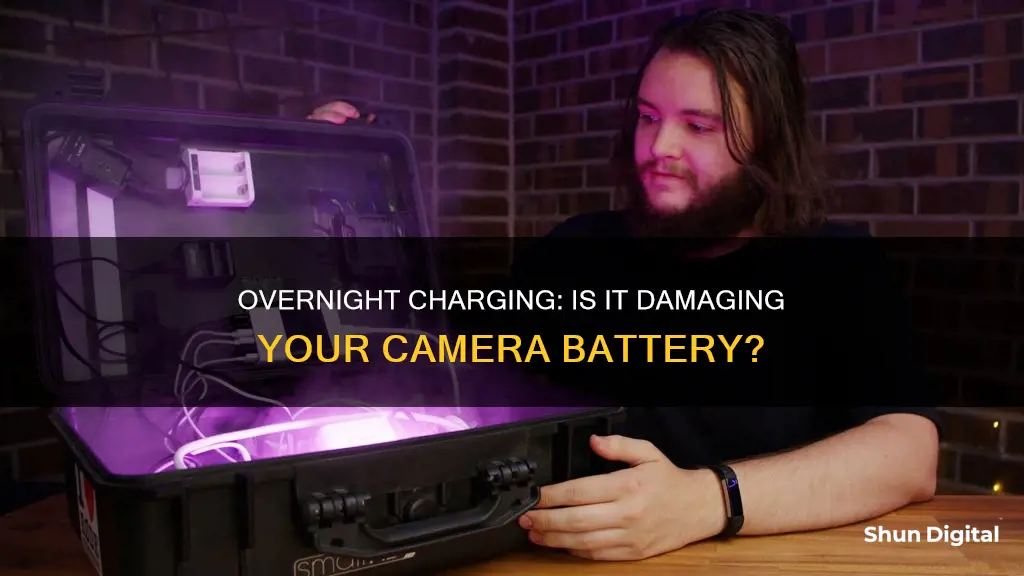
Charging a camera battery overnight can be risky. While modern lithium-ion batteries are built with safety features to prevent overcharging, there is a chance that poor-quality chargers may not have the required safety features, leading to potential battery damage or overheating. Additionally, keeping the battery at a high voltage can reduce its performance and lifespan. It is recommended to use high-quality chargers, remove the battery once it's fully charged, and avoid leaving it connected to the charger for extended periods.
| Characteristics | Values |
|---|---|
| Leaving a camera battery charging overnight | Not recommended |
| Reason | Can reduce the performance and service life of the battery |
| Reason | Constant high voltage can cause strain on the battery |
| Reason | Trickle charges can generate heat and damage the battery |
| Reason | The battery can be overcharged |
| Reason | The battery can be damaged if left on charge for too long |
| Recommendation | Remove the battery from the charger once it has completed recharging |
| Recommendation | Use a timer or smart plug to make sure the charger shuts off automatically after a certain amount of time |
| Recommendation | Store the camera battery outside of the camera and at around 15°C (60°F) |
What You'll Learn
- Overcharging can damage the battery and reduce its performance and service life
- Lithium-ion batteries are vulnerable to constant high voltage
- Trickle charges can generate heat, which can be damaging
- Charging batteries overnight can reduce their lifespan
- Cheap chargers may not have the required safety features

Overcharging can damage the battery and reduce its performance and service life
Leaving your camera battery to charge overnight can have detrimental effects on its performance and longevity. While modern Lithium-ion batteries are designed with overcharge protection, which automatically stops the charging process once the battery reaches full capacity, leaving the battery plugged in after it has been fully charged can still cause damage.
Lithium-ion batteries, including those used in cameras, are highly vulnerable to constant high voltages of electricity. Leaving your camera plugged into a charger overnight will expose the battery to unfiltered power for an extended period, causing it to deteriorate over time. The strain on the battery will lead to a decrease in its capacity to hold a charge, resulting in reduced performance and a shorter service life.
To maintain the health of your camera battery, it is recommended to keep its charge level between 30% and 90%. While occasional overnight charging may not cause significant harm, making it a habit can impact the longevity of your battery. It is advisable to charge your camera battery before bedtime or immediately after waking up, rather than leaving it plugged in for the entire night.
Additionally, it is important to use high-quality chargers and follow the recommended charging practices. Avoid using cheap or imitation chargers that may lack the necessary safety features. By adhering to these guidelines, you can help ensure the safety and extended life of your camera battery.
Charging a VTech Camera: A Step-by-Step Guide
You may want to see also

Lithium-ion batteries are vulnerable to constant high voltage
Yes, Lithium-ion batteries are vulnerable to constant high voltage. Charging a Lithium-ion battery above 4.3V on a Li-ion designed for 4.2V/cell will plate metallic lithium on the anode. The cathode material becomes an oxidizing agent, loses stability and produces carbon dioxide (CO2). The cell pressure rises and if the charge is allowed to continue, the current interrupt device (CID) responsible for cell safety disconnects at 1,000–1,380kPa (145–200psi). Should the pressure rise further, the safety membrane on some Li-ion bursts open at about 3,450kPa (500psi) and the cell might eventually vent with flame.
Charging the Wyze Camera: Quick and Easy Steps
You may want to see also

Trickle charges can generate heat, which can be damaging
Charging a camera battery overnight should not be too much of an issue. However, leaving a battery in the charger for an extended period may cause some damage. This is because the battery will begin to self-discharge, and the charger will kick in to recharge the battery to full capacity. Keeping the battery at or close to 100% capacity can reduce its performance and life.
Trickle charges, which are low-amperage charges, can be damaging because they can generate heat. Applying excess charge amperage can cause off-gassing, and in extreme cases, a battery can explode. This is especially true for lead-acid batteries, where the electrolyte will turn into a gas. However, smart trickle chargers can detect the charge level and adjust the amperage to prevent this.
For lithium-ion batteries, overcharging is not an issue because the charger includes overcharge protection. However, if the battery is left charging, this can still cause damage that will reduce the performance and service life of the battery. This is because the high voltage will stress the battery.
To prevent damage to your battery, it is best to charge it before bedtime so you can remove it from the charger once it reaches 100%. Additionally, when storing a lithium-ion battery, charge it to between 40% and 60% of its capacity and store it outside of the camera at around 15°C (60°F).
Alternative Charging Methods for Your Zimodo Camera
You may want to see also

Charging batteries overnight can reduce their lifespan
Camera batteries, like smartphone batteries, are often Lithium-ion (Li-ion) batteries. While it is not possible to overcharge a Li-ion battery because charging will automatically stop when the battery reaches 100% capacity, leaving the battery charging can cause damage that will reduce the performance and service life of the battery.
Li-ion batteries gradually lose some of their charge over time, even when stored outside of a camera. However, when the battery is left in the camera, the battery will discharge at a much faster rate. This can lead to excessive discharge, causing the batteries to become exhausted over a prolonged period, resulting in damage to the battery and a reduction in battery life.
Similarly, when a Li-ion battery is left in the charger, it will begin to self-discharge. At room temperature (21°C or 70°F), the rate of self-discharge is relatively low, but if the camera battery is much warmer, as it would be at the end of charging, the self-discharge rate will be higher. When the battery's charge falls to 94%, the battery charger will kick in and recharge the battery to full capacity. Keeping the battery at or close to 100% capacity can reduce battery performance and battery life because the high voltage will stress the battery.
Charging your camera battery overnight should not be a major issue as the battery won't be in the charger long enough for multiple charging cycles to cause significant harm. However, if you want to maximise battery life or if you constantly charge the battery overnight, consider charging the battery before bedtime so you can remove the battery once charging is complete.
To summarise, while charging a camera battery overnight will not cause any immediate issues, it can reduce the lifespan of the battery. This is because the high voltage stresses the battery, causing it to degrade faster. Therefore, it is recommended to charge the battery to around 80% and avoid letting it drop below 20% to prolong its lifespan.
Are Camera Batteries Charged? Understanding Camera Battery Basics
You may want to see also

Cheap chargers may not have the required safety features
Lithium-ion batteries, commonly used in cameras, have a low self-discharge rate and can be recharged without reaching a fully depleted state. However, leaving these batteries on a charger for an extended period can cause damage. While the charger's overcharge protection will stop charging once the battery reaches full capacity, the battery will eventually start to self-discharge.
At room temperature, the self-discharge rate is relatively low, but it increases as the battery temperature rises, as it does during charging. This triggers the charger to recharge the battery, leading to a cycle of self-discharging and recharging. Although convenient, charging a camera battery overnight with a cheap charger may result in reduced battery performance and life due to the constant high voltage.
To maintain optimal battery health, it is recommended to remove the battery from the charger once it has completed recharging. Additionally, storing a camera battery at a temperature of around 15°C (60°F) and a charge between 40% and 60% will help prolong its lifespan.
While overnight charging may not cause immediate issues, it is important to prioritize battery health to ensure the best performance and longevity. This is especially important for those who rely on their camera equipment for professional or enthusiast photography and videography.
Charging the 808 Camera: Long First Charge Needed?
You may want to see also
Frequently asked questions
No, it is not recommended to charge your camera battery overnight. Even though modern Lithium-ion batteries are built with overcharge protection, leaving the battery plugged in for a prolonged period can cause damage that will reduce the performance and life span of the battery.
Leaving your camera plugged into an AC charger all night, every night, for a whole year, will cause the battery to withstand unfiltered power for a total of three months. The strain exerted on the battery will cause its capacity to decrease and it may need to be replaced sooner than expected.
The dangers of charging your camera battery overnight include overcharging, heat production, and shortened battery life. Overcharging can damage the battery and cause overheating. Continued charging may also lead to extreme heat, resulting in shortened battery life, decreased performance, or even thermal runaway, where the battery overheats and catches fire or explodes.
To ensure the longevity and safety of your camera battery, follow these guidelines:
- Use the manufacturer's charger or a trusted third-party charger made for your camera model.
- Remove the battery from the charger once it's fully charged.
- Avoid cheap or imitation chargers that may not have the necessary safety features.
- Use a timer or smart plug to automatically shut off the charger after a certain amount of time to prevent overcharging.
- Store your camera batteries in a cool, dry place away from direct sunlight and extreme temperatures when not in use.
To maintain the health of your camera battery, monitor its health regularly, especially if you use it frequently. Modern cameras often provide information about battery health. Additionally, consider changing outdated batteries if you notice a significant decline in performance or battery life.







